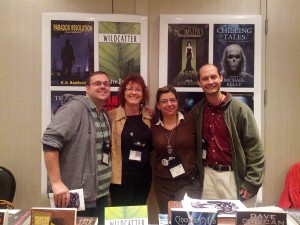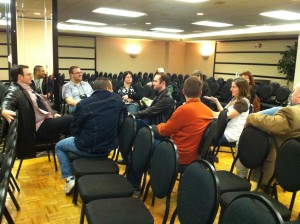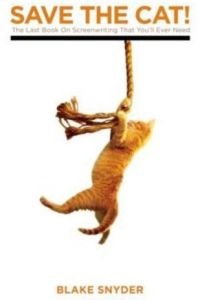Last week, the World Fantasy Convention (“WFC”) was held in Toronto, Canada. For all of you who may not know, WFC is a convention for fantasy and science fiction writers, artists, agents, editors and other professionals. The four day conference has seminars/panels on craft issues. There’s a dealer’s room for hard-to-find, and rare books, and an art show. The price of admission includes a swag bag full of free books, and use of the convention suite. There’s also lots of time for networking, including nightly parties often hosted by publishers, and a closing banquet.
 Four of the Fictorians (Evan Braun, Ace Jordyn, Nancy DiMauro, and Frank Morin, from left to right in the photo) attended this year. Evan asked us to share our thoughts about the conference with you. So, here they are:
Four of the Fictorians (Evan Braun, Ace Jordyn, Nancy DiMauro, and Frank Morin, from left to right in the photo) attended this year. Evan asked us to share our thoughts about the conference with you. So, here they are:
Nancy: I attended my first WFC last year, and through the introduction by fellow Fictorian Colette Vernon met Celina Summers the head editor at the newly formed Musa Publishing. WFC opened doors for me that I never knew were there. I knew I wanted to attend this year’s WFC to connect with friends, further my writing career, and help others do the same. Why did you attend?
Ace: I wanted to see writer friends from all over the world, and WFC makes connecting with friends easy. It’s also a great place to meet new people from writers, editors, agents and publishers.
Frank: I attended for two main reasons. First, to meet with my agent, John Richard Parker from ZENO, in person. He’s based in London, so this was a rare opportunity. Second, I feel it’s vitally important to interact, socialize, and network with other industry professionals. WFC is a great venue to do that.
Nancy: What was the best thing about this year’s WFC?
Ace: Shanghai Steam, an anthology I co-edited, was launched at the con. The anthology authors had a blast at the autograph signing session and readings at the launch. It’s wonderful to see the excitement, and feel the energy of so much creative pride.
Frank: At my first WFC two years ago, I didn’t know what to expect. Luckily, I connected with several other new authors. We spent the conference looking for and talking with agents and editors we wanted to talk with. This year, I still focused on networking and meeting new people. For me, it was deeply rewarding to mentor newer authors at this WFC and continue to learn from more experienced professionals.
Nancy: The best thing about WFC is the conversations I had with people. I spent hours talking  with editors and writers, both well established and new. Brandon Sanderson met with the attending Superstars Writing Seminars alumni, which most of the Fictorians are. Brandon spent about two and a half hours with us. We talked about his outlining technique, working on the Wheel of Time, talking to and working with agents and editors, dealing with deadlines, book tours, writing, Writing Excuses, and so much more.
with editors and writers, both well established and new. Brandon Sanderson met with the attending Superstars Writing Seminars alumni, which most of the Fictorians are. Brandon spent about two and a half hours with us. We talked about his outlining technique, working on the Wheel of Time, talking to and working with agents and editors, dealing with deadlines, book tours, writing, Writing Excuses, and so much more.
There were so many great things that I’d be hard pressed to single out anything “bad” about the experience. If I had to though, I’d say that there never is enough time, and the hotel NEVER staffs the bar right. Even though the Con officially lasts 4 days, those days fly. There’s so much to do. The Con runs from 8am when the Con Suite opens until 4-ish am, when the last party goer has returned to his room. A lot happens unofficially at the bar, and you can find people there at all hours. Despite being warned that there will be anywhere from 50 to 100 people at the bar at any given time, the hotel never has enough staff. When they can finally get you your drink (whether spirited or not), tip well as those few staff members are working hard.
Ace: All the activity means that my least favorite thing is the lack of sleep. There’s so much to do. So many people to see and meet. It’s electric and the conversations go long into the night.
Frank: For me, it’s the travel distance.
Nancy: One of the reasons I love WFC is you can accomplish more there than you can in two years outside WFC. What was the most useful thing about it for you?
Frank: This is tied closely back to question about the best WFC-related thing – the connections we make. WFC is a wonderful place to network and interact with professionals representing all aspects of writing, including other authors, agents, editors, and publishers. The first several years of writing, I didn’t attend conventions. I wish I had. There are so many benefits to rubbing shoulders with others in the same business. People at WFC have consistently proven their willingness to share their knowledge, mentor newcomers, and provide opportunities.
Ace: Getting my finger on the pulse of what direction the industry is moving not only with writing trends but on the publishing environment.
Nancy: Next year’s WFC will be in Brighton, England. Other than buy your membership now since it will likely sell out, any tips for those attending future WFCs?
Ann: Relax and enjoy yourself. Have fun. Talk. Attend panels, readings and parties; not only do you learn lots; you never know who you’ll meet.
Frank: Get to know the hospitality suite. It’s a great place to mingle, and to eat. This year’s hospitality suite (or con suite as it’s often known) was well stocked with surprisingly good food. I made some good contacts there and met a lot of people.
Put yourself out there. Most people were very outgoing and eager to talk with others. I saw a few who seemed to be lingering on the fringes, and managed to draw a couple of them into conversations. They were new authors with few connections, who felt a little lost. Many of us authors are introverted people, but we have to set that aside at conferences and take the initiative to meet people. The connections are invaluable. Once you have a base group of friends and acquaintances, it makes it that much easier to reach out even further.
One way to start getting to know people is to attend other writing seminars or workshops. For example, there were 8-10 of us who were alumni of the Superstars Writing Seminars. Those events were excellent in and of themselves, but now provided a secondary benefit. We all came to WFC already having a large group of friends to socialize with, share advice with, and to help us maximize our WFC experience.
Nancy: To build on what Frank was saying, the benefits of WFC or any seminar or convention might not be immediately obvious, but there are long-term benefits. Every relationship you maintain is one where you can help someone else’s writing career, and that person, in turn, can assist you. Just remember to pay it forward.
Speaking of which, any tips on how to approach editors/agents at WFC?
Frank: Remember, relationships come first. We all want to meet editors, agents, other authors, etc. They want to meet people too. Relationships open doors both ways. But before we can make that pitch, before an editor will do more than look for a way to excuse themselves at the first opportunity, we need to establish a connection. Be friendly, but not desperate. Ask them about their projects, what they’re interested in, what books they’ve been reading. Look for things you have in common that can help build that connection. If you’re successful, they’ll ask for a pitch or give you a card. If you’re not, they’ll slip away no matter how hard you try to chase them. DON”T CHASE THEM. This is a business, and we are successful when we act like professionals.
One thing I had not understood prior to my first WFC is that many agents don’t really want a full pitch, although some do, so be prepared! I butchered my first live pitch, but thankfully the agent took the time to explain why I was so awful. She wouldn’t have if I hadn’t made a solid connection first. For those agents who do not want a full pitch, they’ll give you their card. This is a good thing. It opens the door to then send them a query per whatever guidelines they have posted on their website, and reference that meeting at WFC in the query. My agent was one of several I queried after WFC in 2010.
Ace: My nervousness at meeting editors and agents disappeared when I realized I wanted to buy their services. Yes, getting my novels published is the ultimate goal but it’s important to me that I find an agent who will work hard for me, and a publisher who has access to the appropriate markets who will work with me to make us both successful. An attitude of selling means I know my product; I have questions I want to ask and so all that makes me less nervous. And yes, my pitches are all prepared.
Nancy: I saw your pitch sheet. It was really impressive. If you have a story that’s looking for a home, it helps to be prepared because you never know when someone will ask what you are working on. Having a prepared pitch helps reduce the nervousness. And I can’t emphasis what Frank said enough. Make a connection first and be a professional and polished version of yourself. Be courteous. Manners matter.
Frank: Also, if you are too nervous to approach an agent or editor, rely on your friends, or people you’ve made a connection with at the Con. Have another author you know introduce you to an agent or editor. Chances are someone helped that person out when she was getting started, so she’s happy to help you, just like you’ll be happy to do it for someone else down the road.
Nancy: What do you know now that you wished you knew before attending WFC?
Ace: I think I’d make plans with writer friends to stay an extra day or two to either hang out or have some writing time together. The con generates great energy that’s worth hanging on to for as long as possible.
Frank: I wish I had taken more time to research people I wanted to talk with. Work was very busy prior to WFC so I didn’t have enough time to do the research I needed. For example, I wanted to talk with a couple of editors, but I didn’t manage to learn the names of the other editors at the publisher. I had a productive time, but there were definitely opportunities missed due to lack of preparation.
Final thoughts from all of us:
For those who have not attended WFC, we can’t recommend it highly enough. The publishing industry is small, and, in some ways, getting smaller as it changes. It’s important to become known and make connections. Unlike, say some of the conventions where people walk about in costumes, WFC is a primarily professional convention. People attending WFC are, generally, those in the industry who we, as writers, will do business with. Making connection with people at WFC may mean the difference between publishing or not since people want to do business with someone they know.
See you in Brighton next year!



